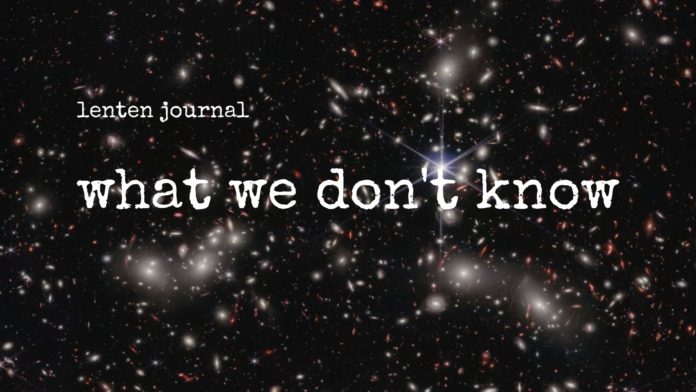One of my jobs along the way was as a Creative in the Apple Store, which meant I helped people learn how to use their various devices. We often talked about those who didn’t know what they didn’t know, which was another way of saying the thing that brought a person in wasn’t necessarily the thing they most needed to learn; we had to help them see what they didn’t know so they could ask questions that would help them get where they wanted to be.
I have several arenas of my life where I am aware I don’t know what I don’t know. My car would be a good example. To drop it off at the mechanic for updates, service, or repair is an act of blind trust because I have no real understanding of what it takes to make my car run well other than make regular visits to the service department.
When it comes to cars, I am not that drawn to learn more. When it comes to cosmology, I am. So the news this week that the James Webb Space Telescope sent back images that seem to have blown the minds of cosmologists sent me reading things I didn’t fully understand because I am fascinated by the universe. The data is new and has yet to be fully researched, but what is evident is that the working models of how the universe came into being and grew in the beginning have been blown up. Scientists have been surprised by what they didn’t know they didn’t know.
I’m sure it won’t be long before someone writes or talks about the failure of scientists, or uses this turn of events as a way to dredge up a new round of creationist warfare, and that saddens me because the news that the universe could be 100 times larger than we imagined is not a failure; it’s a revelation. And the scientists interviewed in the articles I read responded with excitement to find they had more to learn. Though I am sure science has its share of fundamentalists, like any other discipline, I am encouraged by general idea that one of the premises researchers follow is that they don’t know it all. They continue to look for what they are missing.
I wish we were better at that, when it comes to theology, but we’re not. Too often we have chosen intransigence over imagination, or even inspiration. We camp out in certainty rather than explore what we don’t know that we don’t know.
I read a description recently of those who sailed the sees from Western nations to map the rest of the world as “colonizers who saw themselves as explorers.” I thought the phrasing was incisive because it highlights the impact of their voyages along with the possibility that it might not match the intent. The story they told themselves didn’t match what actually happened. They didn’t know what they didn’t know and acted with a devastating certainty.
Even in our little town we have enough light rising from our buildings to hinder our view of the night sky. I can find Orion and a couple of his companions, but I cannot see the fulness of the starlight. It’s hard to stare into what looks like an empty sky and imagine light that won’t come into view for another 13.5 billion years. Orion’s belt is more than the three dots I can see. I don’t know what I don’t know. And as I read the story of Jesus’ time in the wilderness as I prepare to preach on Sunday, I wonder, as I said last night, what happened beyond the conversation that was written down. Look closely at all the gospel stories. There is as much open space as there is in the evening sky; yet, in both cases, something is there. We just don’t know what it is.
May we make room for what we don’t know that we don’t know.
Peace,
Milton
Thanks for reading. I write a free weekly newsletter, mixing metaphors that comes out every Tuesday. I would love for you to subscribe. If you would like to support my writing, you can become a sustaining member or buy me a cup of coffee.

“Every day, I learn something new about how little I actually know…” – a wise grandfather